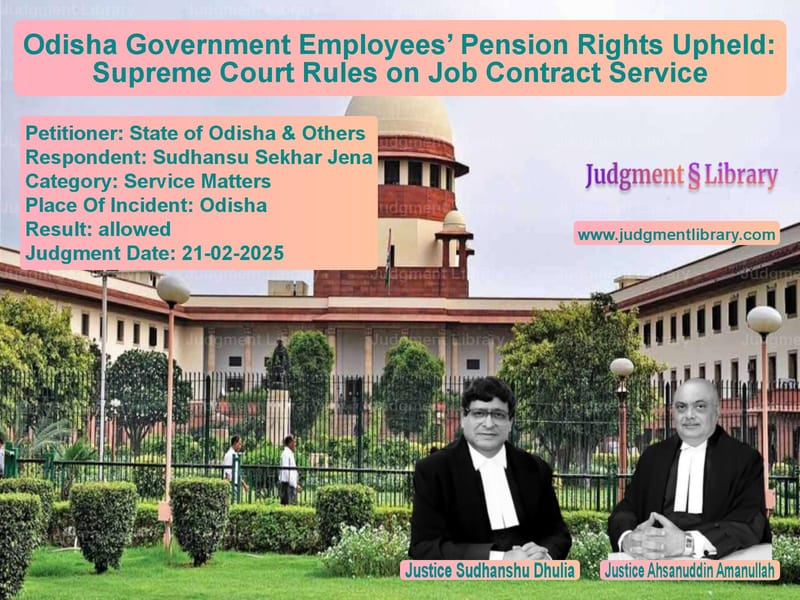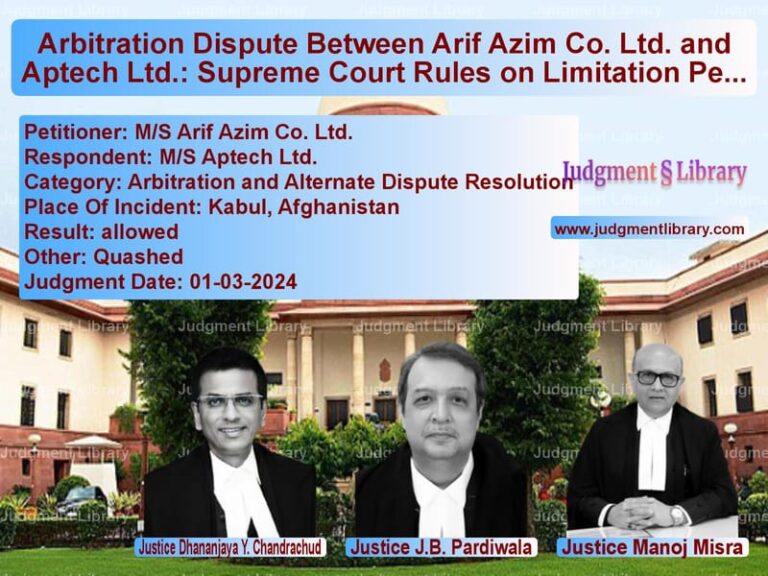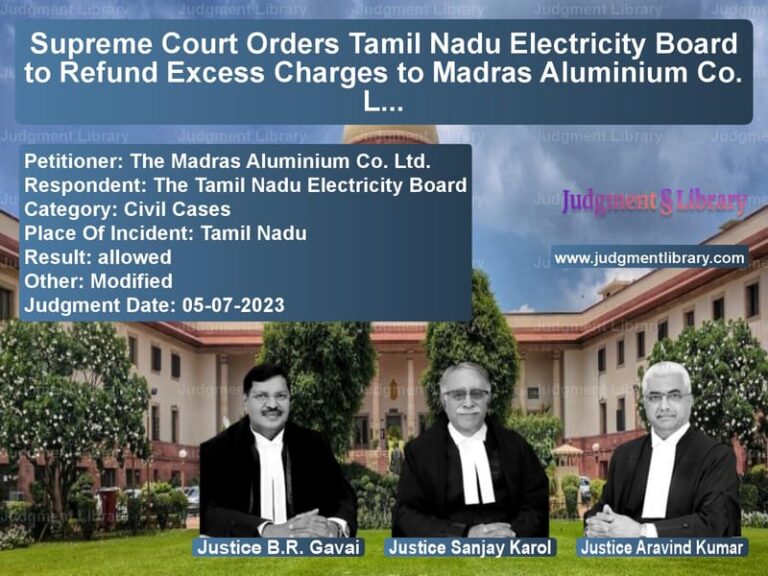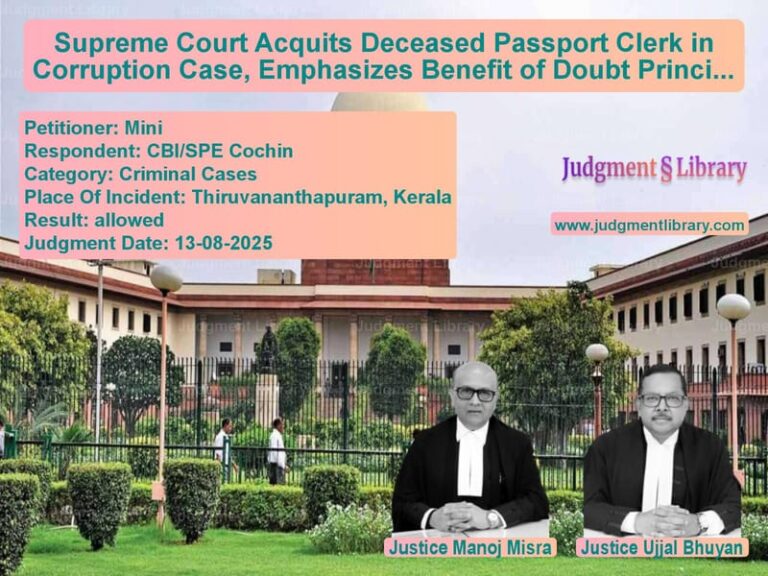Odisha Government Employees’ Pension Rights Upheld: Supreme Court Rules on Job Contract Service
The case of State of Odisha & Others vs. Sudhansu Sekhar Jena is a landmark ruling that clarifies the pension rights of employees who were initially hired as ‘Job Contractors’ before transitioning to regular government service. The Supreme Court examined whether the entire period of job contract service should be counted for pensionary benefits and the legal obligations of the state in implementing pension reforms.
Background of the Case
The dispute arose from multiple appeals filed by the State of Odisha challenging the Orissa High Court’s order that dismissed the state’s writ appeals due to inordinate delays. The core issue was whether employees hired as job contractors should have their full tenure counted toward pension benefits under the Odisha Civil Services (Pension) Rules, 1992.
The key timeline of events is as follows:
- 1992: The Orissa High Court ruled in Settlement Class-IV Job Contract Employees Union vs. State of Odisha that job contractors should receive pension benefits, and their service periods should be counted, even with breaks in employment.
- 1997 (December 12): The Odisha government issued a memorandum reiterating the High Court’s directive, ensuring pension eligibility for job contractors.
- 2001: The Odisha Pension Rules were amended to include a provision that limited the job contract service period to only the years necessary to qualify for pension.
- 2011: The Orissa Administrative Tribunal ruled that the entire job contract tenure should be considered for pension calculations, contradicting the 2001 amendment.
- 2022 (July 2): The Odisha government re-examined the issue and reaffirmed the decision that only a portion of job contract service should be counted.
- 2025 (February 21): The Supreme Court ruled in favor of the state, setting aside the High Court’s order and confirming the legality of the 2001 amendment.
Petitioners’ Arguments (State of Odisha)
The state government contended:
- The Orissa Administrative Tribunal misinterpreted the 1992 High Court judgment by allowing full service period counting.
- The 2001 amendment was enacted to limit pensionable years for job contract employees.
- The state suffered from significant financial liabilities due to misinterpretation by lower courts and tribunals.
- The distinction between work-charged employees and job contract employees was valid under the Odisha Pension Rules.
The state’s counsel argued:
“The Tribunal’s decision contradicts statutory amendments. The financial burden of counting full service tenure is unsustainable. The law must be followed as per the 2001 amendment.”
Respondent’s Arguments (Job Contractors)
The employees argued:
- Their entire job contract service should be counted towards pension as per the 1992 High Court judgment.
- The government’s decision to limit pensionable service was discriminatory and violated Article 14 of the Constitution.
- Many job contractors worked for decades but were regularized only in their final years, making them ineligible for pension.
- The state failed to challenge the Tribunal’s order in time, leading to unjustified delays.
Their counsel argued:
“Job contractors performed essential government functions for years. Denying them full pension benefits is unfair and unconstitutional.”
Supreme Court’s Observations
The Supreme Court analyzed the Odisha Pension Rules, past judgments, and financial implications. The key observations included:
- The 2001 amendment was legally valid and set clear rules on pension eligibility.
- The Administrative Tribunal’s ruling allowing full service calculation was incorrect.
- The distinction between work-charged employees and job contractors was valid under service rules.
- The Odisha government was at fault for delays but not in its legal stance.
Final Judgment
The Supreme Court ruled:
- Overturned the High Court’s order and upheld the 2001 amendment.
- Limited pension eligibility to only the years required for qualification.
- Ordered the state to compensate affected employees with Rs. 1,50,000 each for delays.
- Directed the state to file reviews in dismissed cases within four weeks.
The Court ruled:
“Pensionary benefits must be granted in accordance with statutory rules. The 2001 amendment clearly defines eligibility, and misinterpretation by lower courts led to financial and administrative burdens.”
Conclusion
The Supreme Court’s ruling reinforces the validity of statutory pension regulations while recognizing the need for administrative efficiency. The decision sets a precedent for interpreting pension laws for job contract employees in Odisha and similar cases in other states.
Petitioner Name: State of Odisha & Others.Respondent Name: Sudhansu Sekhar Jena.Judgment By: Justice Sudhanshu Dhulia, Justice Ahsanuddin Amanullah.Place Of Incident: Odisha.Judgment Date: 21-02-2025.
Don’t miss out on the full details! Download the complete judgment in PDF format below and gain valuable insights instantly!
Download Judgment: state-of-odisha-&-ot-vs-sudhansu-sekhar-jena-supreme-court-of-india-judgment-dated-21-02-2025.pdf
Directly Download Judgment: Directly download this Judgment
See all petitions in Pension and Gratuity
See all petitions in Employment Disputes
See all petitions in Public Sector Employees
See all petitions in Judgment by Sudhanshu Dhulia
See all petitions in Judgment by Ahsanuddin Amanullah
See all petitions in allowed
See all petitions in supreme court of India judgments February 2025
See all petitions in 2025 judgments
See all posts in Service Matters Category
See all allowed petitions in Service Matters Category
See all Dismissed petitions in Service Matters Category
See all partially allowed petitions in Service Matters Category






